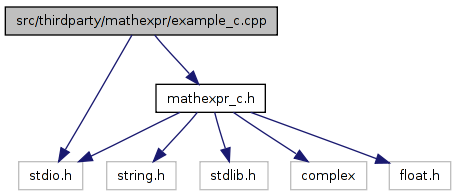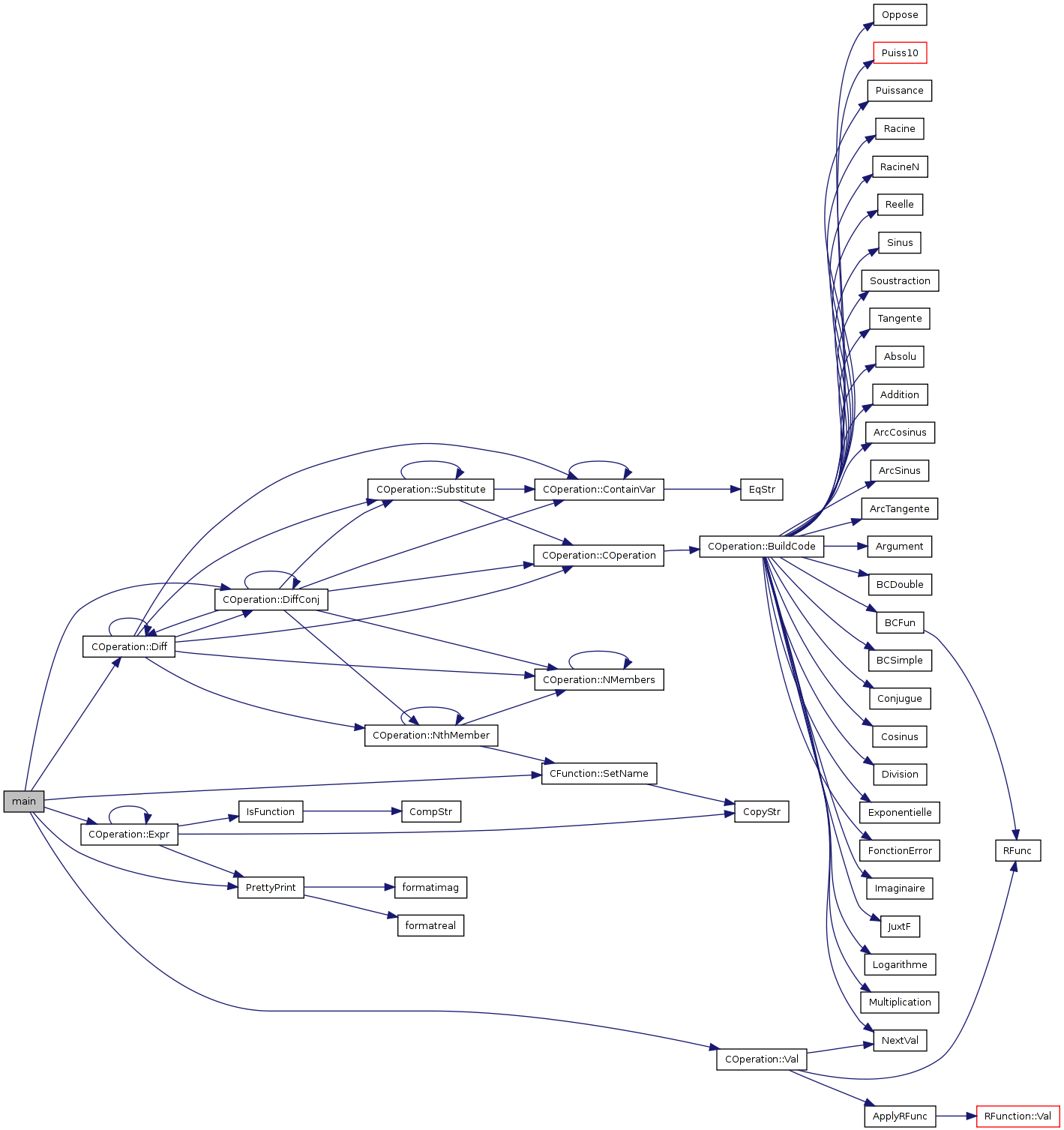
#include <stdio.h>#include "mathexpr_c.h"

Go to the source code of this file.
Functions | |
| int | main () |
| int main | ( | ) |
Definition at line 29 of file example_c.cpp.
References COperation::Diff(), COperation::DiffConj(), double_complex, COperation::Expr(), PrettyPrint(), CFunction::SetName(), COperation::Val(), x, and z.
00030 { 00031 00032 // The number that the variable "x" will point to 00033 double_complex x; 00034 // Creates a variable named "x" and which value will be x 00035 CVar xvar ( "x" , &x ); 00036 00037 // Asks for a fomula depending on the variable x, e.g. "sin 2x" 00038 char s[500]=""; 00039 printf("Enter a formula depending on the variable x:\n"); 00040 gets(s); 00041 00042 // Creates an operation with this formula. The operation depends on one 00043 // variable, which is xvar ; the third argument is an array of pointers 00044 // to variables; the previous argument is its size 00045 CVar* vararray[1]; vararray[0]=&xvar; 00046 COperation op ( s, 1, vararray ); 00047 00048 // Affects (indirectly) a value to xvar 00049 x=3; 00050 // Printfs the value of the formula for x=3; 00051 printf("%s = %s for x=3\n\n", op.Expr(), PrettyPrint(op.Val()) ); 00052 00053 // Creates a function name which can be used in later functions to refer to the operation op(x) 00054 CFunction f (op, &xvar); f.SetName("f"); 00055 00056 // Creates a second variable named y, and a formula depending on both x and y 00057 double_complex y; 00058 CVar yvar ( "y" , &y ); 00059 CVar* vararray2[2]; // table of variables containing the adresses of xvar and yvar 00060 vararray2[0]=&xvar; vararray2[1]=&yvar; 00061 00062 // Asks for a formula using x, y and the already-defined function f, e.g. x+f(3y) 00063 printf("Enter a formula using x, y and the function f: x |-> %s that you just entered :\n", op.Expr()); 00064 gets(s); 00065 CFunction* funcarray[1]; funcarray[0]=&f; 00066 COperation op2 ( (char*)s , 2 , vararray2 , 1, funcarray ); 00067 // vararray2 is a CVar* array with two elements 00068 // funcarray is a CFunction* array with one element 00069 y=5; 00070 printf("Value for x=3, y=5 : %s\n", PrettyPrint(op2.Val()) ); 00071 00072 // Turns the last expression into a function of x and y 00073 CFunction g(op2, 2, vararray2); g.SetName("g"); 00074 00075 // Here is another way to do it 00076 double_complex z,t; 00077 CVar zvar("z", &z), tvar("t", &t); 00078 COperation op3,zop,top; 00079 zop=zvar; top=tvar; // constructs, from a variable, the operation returning its value 00080 00081 op3=g( (zop+top, top^2) ); // Ready-to-use ; needs two pairs of ( ) 00082 // Now op3 contains the operation op2 with x replaced with z+t, and y replaced with t^2 00083 00084 z=5;t=7; 00085 printf("\nLet g be the function g : x,y |-> %s\n", op2.Expr()); 00086 printf("Value of %s for z=5,t=7:\n %s\n", op3.Expr(), PrettyPrint(op3.Val()) ); 00087 00088 COperation dopdt=op3.Diff(tvar); // Computes the derivative of op3 w.r.t t 00089 printf("Value of d/dt (g(z+t,t^2)) = %s for z=5,t=7:\n %s\n", dopdt.Expr(), PrettyPrint(dopdt.Val()) ); 00090 COperation dopdtbar=op3.DiffConj(tvar); // Computes the derivative of op3 w.r.t the conjugate of t 00091 printf("Value of d/dtbar (g(z+t,t^2)) = %s for z=5,t=7:\n %s\n", dopdtbar.Expr(), PrettyPrint(dopdtbar.Val()) ); 00092 00093 return 0; 00094 }

 1.5.4
1.5.4